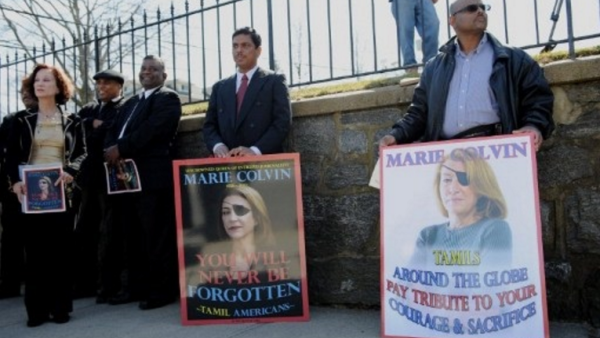JERUSALEM -- In the past week, the government of Syria has been hit with two separate lawsuits filed by the families of people who were killed recently in Syria. The first was filed by the family of Marie Colvin, an American journalist who apparently perished in a Syrian air strike in 2012. The second lawsuit was filed by the family of Hicham Abdul Rahman, a Syrian doctor who died in a regime prison in 2014.
Both suits target Syrian President Bashar Assad, and claim that he was personally responsible for the deaths. This isn’t the first time Assad’s been sued by people killed in the Syrian civil war: in April the family of Steven Sotloff also sued Assad. Sotloff was an American-Israeli journalist who was beheaded by Daesh (also known as ISIS or the Islamic State) in 2014. The Sotloff family’s lawsuit contends that Assad provided financial, material and military assistance to Daesh, and so is therefore responsible for Sotloff’s murder.
It seems unlikely that Assad will cooperate with the courts--especially those outside of Syria. He’s repeatedly shown the world that he plays by his own rules, and there’s no apparent reason to think a lawsuit or two will change his mind.
So why sue?
One reason that the relatives of those killed in Syria say they sue Assad is to obtain a measure of justice. “I’m bringing this lawsuit because I want my sister’s killers to be brought to justice,” said Cat Colvin, Marie Colvin’s sister, in a statement that was emailed to Al Bawaba. “I want them to be held accountable.”
The Colvins’ suit against Assad alleges that the Syrian government had an official policy of using force to silence international journalists who were reporting on the Syrian civil war. Lawyers with Reporters Without Borders and the Washington D.C.-based Center for Justice and Accountability spent years researching the circumstances of Colvin’s death, which occurred in a clandestine media center in the city of Homs in 2012. Citing official Syrian government documents, the lawsuit claims that the Assad government spied on Colvin and then carried out air strikes on the building where she was working.
In the case of Rahman, the 37-year-old Syrian doctor allegedly tortured to death in a prison near Damascus, the lawyer who filed the suit said the point was to remind the international community of Assad’s brutality, because of the possibility that a future peace agreement could see Assad still in office.
Syria’s frozen assets
The Colvin family and others like them could win financial compensation from Syria for the deaths of their loved ones. The US government holds millions of dollars in frozen Syrian assets that a US court could use to pay Colvin’s family, Scott Gilmore, the lead attorney in the Colvin case, told the Washington Post on Sunday.
In the past, similar lawsuits have been brought against Iran and Cuba, and sometimes those cases have resulted in large damage awards, the Associated Press notes. But there are difficulties when it comes to tracking down frozen assets. As a New Jersey lawyer who’s currently suing Iran told Reuters on Sunday, foreign governments like Syria often operate behind layers of intermediaries, so it could take decades to find out if they own an office building in Boston or somewhere.
A dangerous precedent
Even though Assad is accused of mass atrocities, it’s not clear that setting a precedent for the suing of foreign governments is a good idea. The US Senate, for example, just passed a bill that would allow families of those who died in the September 2001 attacks on the World Trade Center to sue the government of Saudi Arabia, which may have supported some of the hijackers. If Saudi Arabia did play a role in the attack, it may seem natural that it be held liable for the deaths.
But going down this road would be “a big mistake,” the editorial board of The Los Angeles Times said in a column in April. Allowing US citizens to sue Saudi Arabia over 9/11 would weaken the legal principle of “sovereign immunity,” the Times pointed out. Sovereign immunity is a concept in international law that, in the vast majority of cases, prevents governments from being forced to answer judgments passed by the courts of foreign countries.
Sovereign immunity “serves as needed protection against trumped up or politicized prosecutions in courts around the world,” the Times’s editorial said. “If Congress strips governments everywhere of their protection in US courts, those countries will almost certainly adopt similar policies against the US.”
For example, what’s to stop the families of people killed by Saudi Arabia’s air strikes on Yemen from suing the US, which is providing logistical support to the Saudi air force? Innocent civilians killed by US-supported regimes in Iraq, Turkey, Jordan, the Palestinian Territories, Libya, Egypt, Nigeria, Kenya, Ethiopia, Pakistan, Afghanistan--to name a few--could also take the US government to court if such a precedent is set. However grief-stricken the families of those killed in Syria may be, they should consider the ramifications that their lawsuits could have.
The final option?
Still, such lawsuits may serve an important purpose. In the absence of press freedom to report on Syria, they may help to shed light on crimes committed by Assad and his associates. The Syrian regime has shown time and time again that it will do whatever is necessary to remain in power--on Wednesday, for example, its army advanced on the last remaining road into rebel-controlled Aleppo, threatening to besiege the 300,000 people who live there, cutting them off from food, water and medical supplies.
If Assad remains unbeatable on the battlefield, fighting him in court may be one of the last options his opponents have.
-Hunter Stuart







